人教版新目标七年级上Unit9单词 重点句型 语法解析
人教版七年级上册英语Unit9知识点梳理及语法讲义(教师版)
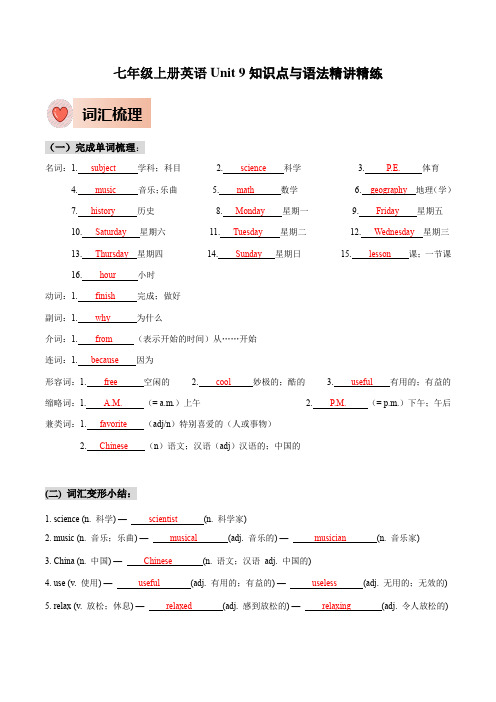
七年级上册英语Unit 9知识点与语法精讲精练词汇梳理(一)完成单词梳理:名词:1. subject学科;科目 2. science 科学 3. P.E. 体育4. music 音乐;乐曲5. math 数学6. geography 地理(学)7. history 历史8. Monday 星期一9. Friday 星期五10. Saturday 星期六11. Tuesday 星期二12. Wednesday 星期三13. Thursday 星期四14. Sunday 星期日15. lesson 课;一节课16. hour 小时动词:1. finish 完成;做好副词:1. why 为什么介词:1. from (表示开始的时间)从……开始连词:1. because 因为形容词:1. free 空闲的 2. cool 妙极的;酷的 3. useful 有用的;有益的缩略词:1. A.M. (= a.m.)上午 2. P.M. (= p.m.)下午;午后兼类词:1. favorite (adj/n)特别喜爱的(人或事物)2. Chinese (n)语文;汉语(adj)汉语的;中国的(二) 词汇变形小结:1. science (n. 科学) — scientist (n. 科学家)2. music (n. 音乐;乐曲) — musical (adj. 音乐的) — musician (n. 音乐家)3. China (n. 中国) — Chinese (n. 语文;汉语adj. 中国的)4. use (v. 使用) — useful (adj. 有用的;有益的) — useless (adj. 无用的;无效的)5. relax (v. 放松;休息) — relaxed (adj. 感到放松的) — relaxing (adj. 令人放松的)【练一练】用所给词的适当形式填空1.We have nine ___subjects___(subject) at school.2.Do you think P.E. is __relaxing____ (relax)?3.He always ___plays_____ (play) games with us.4.Mr. Lee is our __Chinese ___ (China) teacher.5.I want to meet (meet) you in the park this afternoon.6.I think playing volleyball is very relaxing (relax). I love it.7.Are puter games very ___useful_____ (use) for you?8.Miss Wang’s classes (class) are interesting.9.What’s her (she) favorite food?10.We have four lessons (lesson) this morning.(三) 短语攻关:for sure 无疑;肯定from...to... 从……到……favorite subject 最喜欢的学科play games with sb 和某人玩游戏the next day 第二天Chinese class 语文课after that 在那之后have an art lesson 上一节美术课for two hours 两小时on Friday afternoon 在星期五下午知识点梳理1. What’s your favorite subject? 你最喜欢的学科是什么?【用法详解】知识点1:(1)favorite作形容词,意为“特别喜爱的”,通常用于名词前作定语,其前常与形容词性物主代词或名词所有格搭配使用。
人教版新目标初一上册英语unit9知识点

人教版新目标初一上册英语unit9知识点人教版新目标初一(七年级)上册英语unit9知识点,是由中考网小编特整理的,主要包括句型、主格、句式、词汇及相关的练习,适合新初一同学们学习,也适合教师教学使用,供大家参考!Unit 9 Do you want to go to a movie?词汇1. go to a movie 去看电影同义表达有:go to moviesgo to the cinema go to see a film2. action movie 动作片3. want to do sth. 想做某事 want to go to a movie 想看电影want to see a comedy 想看喜剧片4. Beijing Opera 京剧5. Chinese history 中国历史6. my favorite actor 我最喜欢的演员 a great actor 一位伟大的演员7.a very successful thriller 一部非常成功的恐怖 a very successful comedy一部非常有趣的喜剧片8. a new movie 一部新电影9. on weekends 在周末10. Shaolin Temple 少林寺句型:Do you want to go to a movie? Yes, I do./ No, I don’t.Does he want to go to a movie? Yes, he does./No, he doesn’t.What kind of movies do you like? I like action movies and comedies.I like thrillers and l like Beijing Opera.I like comedies but I don’t like documentaries.She often goes to see Chinese action movies on weekends.She thinks she can learn about Chinese history.He really likes his movies.Mike’ father likes it, too! = Mike’s father also like it.I think it’s boring/exciting/interesting/relaxing.She is bored/excited/interested/relaxed.语法:too, also也,都用于肯定句中,但是also用于句中,too用于句末,且用逗号隔开。
七年级英语上册重点知识点归纳(Unit 9新版人教新目标)
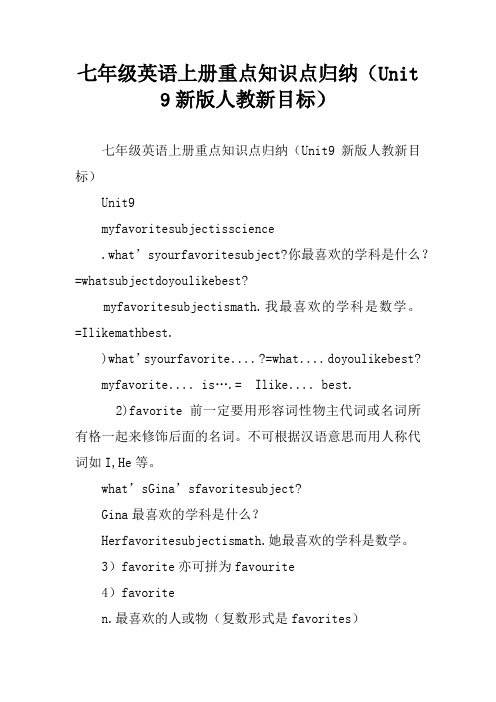
七年级英语上册重点知识点归纳(Unit9新版人教新目标)七年级英语上册重点知识点归纳(Unit9新版人教新目标)Unit9myfavoritesubjectisscience.what’syourfavoritesubject?你最喜欢的学科是什么?=whatsubjectdoyoulikebest?myfavoritesubjectismath.我最喜欢的学科是数学。
=Ilikemathbest.)what’syourfavorite....?=what....doyoulikebest?myfavorite....is….= Ilike....best.2)favorite前一定要用形容词性物主代词或名词所有格一起来修饰后面的名词。
不可根据汉语意思而用人称代词如I,He等。
what’sGina’sfavoritesubject?Gina最喜欢的学科是什么?Herfavoritesubjectismath.她最喜欢的学科是数学。
3)favorite亦可拼为favourite4)favoriten.最喜欢的人或物(复数形式是favorites)Theseclothesaremyfavorites.这些衣服是我最喜欢的。
whichcolorisyourfavorite?哪种颜色是你最喜爱的?2.whydoyoulikemath?你为什么喜欢数学?Becauseit’sinteresting.因为它很有趣。
3.How’syourday?今天过得如何?It’sok.还行。
Great!棒极了!4.have+学科:上某一学科的课。
haveEnglish上英语课haveaclass/lesson上课havebreakfast/lunch/dinner吃早饭/中饭/晚饭haveasoccergame举行足球比赛haveaschooltrip开展校外活动haveaparty举行派对;举办聚会5.That’sforsure.的确如此。
新版新目标七上Unit9词汇详细用法
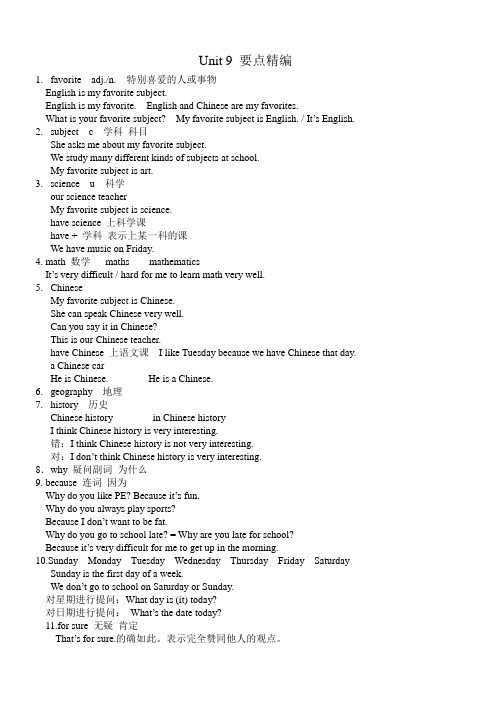
Unit 9 要点精编1.favorite adj./n. 特别喜爱的人或事物English is my favorite subject.English is my favorite. English and Chinese are my favorites.What is your favorite subject? My favorite subject is English. / It’s English.2.subject c 学科科目She asks me about my favorite subject.We study many different kinds of subjects at school.My favorite subject is art.3.science u 科学our science teacherMy favorite subject is science.have science 上科学课have + 学科表示上某一科的课We have music on Friday.4. math 数学maths mathematicsIt’s very difficult / hard for me to learn math very well.5.ChineseMy favorite subject is Chinese.She can speak Chinese very well.Can you say it in Chinese?This is our Chinese teacher.have Chinese 上语文课I like Tuesday because we have Chinese that day.a Chinese carHe is Chinese. He is a Chinese.6.geography 地理7.history 历史Chinese history in Chinese historyI think Chinese history is very interesting.错:I think Chinese history is not very interesting.对:I don’t think Chinese history is very interesting.8.why 疑问副词为什么9. because 连词因为Why do you like PE? Because it’s fun.Why do you always play sports?Because I don’t want to be fat.Why do you go to school late? = Why are you late for school?Because it’s very difficult for me to get up in the morning.10.Sunday Monday Tuesday Wednesday Thursday Friday SaturdaySunday is the first day of a week.We don’t go to school on Saturday or Sunday.对星期进行提问:What day is (it) today?对日期进行提问:What’s the date today?11.for sure 无疑肯定That’s for sure.的确如此。
人教版七年级上册Unit9重点单词 短语 语法
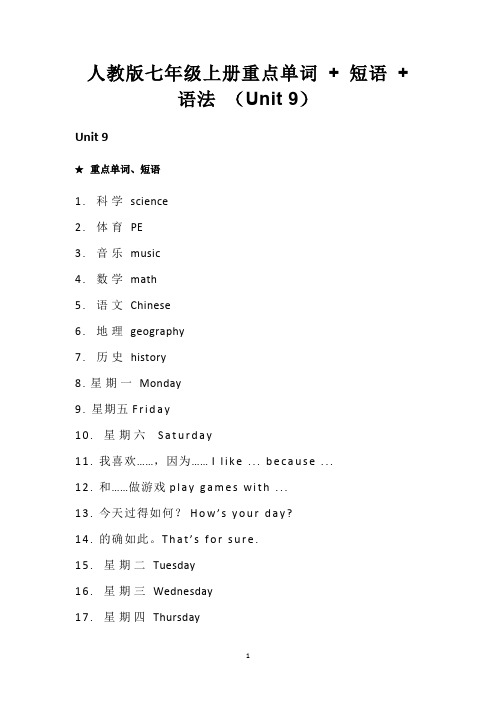
人教版七年级上册重点单词+ 短语+语法(Unit 9)Unit 9★重点单词、短语1.科学science2.体育PE3.音乐music4.数学math5.语文Chinese6.地理geography7.历史history8.星期一Monday9.星期五 F r i d a y10.星期六S a t u r d a y11.我喜欢……,因为…… I l i k e ...b e c a u s e ...12.和……做游戏 p l a y g a m e s w i t h ...13.今天过得如何?H o w’s y o u r d a y?14.的确如此。
T h a t’s f o r s u r e.15.星期二Tuesday16.星期三Wednesday17.星期四Thursday18.星期天Sunday19.忙碌的busy20.空闲的free21.极妙的;酷的cool22.有用的useful23.难但是有趣 d i f f i c u l t b u t i n t e r e s t i n g24.简单且有趣 e a s y a n d f u n25.在那之后 a f t e r t h a t26.从……到……f r o m ...t o ...27.持续某段时间 f o r+段时间28.想要(某人)做某事 w a n t(s b)t o d o s t h29.我们的语文老师王老师是个很有意思的人。
O u r C h i n e s e t e a c h e r,M r s W a n g,i s g r e a t f u n.30.那对你来说合适吗? I s t h a t O K w i t h y o u?★重点语法特殊疑问句是用来对句子中某一部分提问的疑问句,这种句子一般以特殊疑问词开头。
常见的疑问代词有:w h a t、w h o,疑问副词有:w h e r e、h o w、w h e n、w h y。
人教版新目标七年级英语上册第九单元Unit9My favorite subject is science单元大归纳
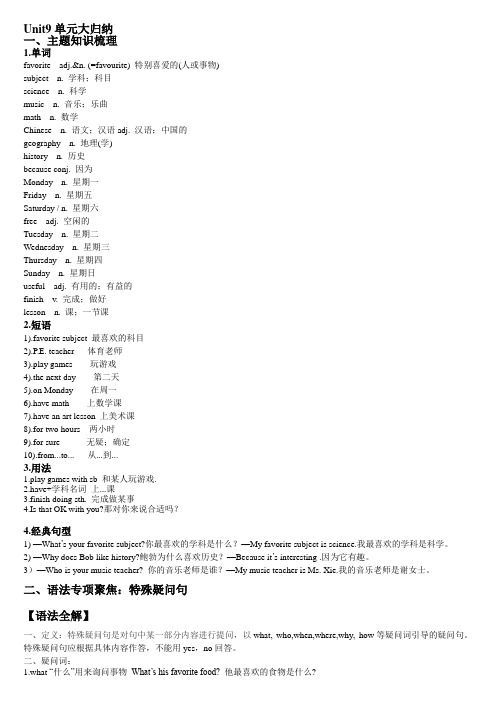
Unit9单元大归纳一、主题知识梳理1.单词favorite adj.&n. (=favourite) 特别喜爱的(人或事物)subject n. 学科;科目science n. 科学music n. 音乐;乐曲math n. 数学Chinese n. 语文;汉语adj. 汉语;中国的geography n. 地理(学)history n. 历史because conj. 因为Monday n. 星期一Friday n. 星期五Saturday / n. 星期六free adj. 空闲的Tuesday n. 星期二Wednesday n. 星期三Thursday n. 星期四Sunday n. 星期日useful adj. 有用的;有益的finish v. 完成;做好lesson n. 课;一节课2.短语1).favorite subject 最喜欢的科目2).P.E. teacher 体育老师3).play games 玩游戏4).the next day 第二天5).on Monday 在周一6).have math 上数学课7).have an art lesson 上美术课8).for two hours 两小时9).for sure 无疑;确定10).from...to... 从...到...3.用法1.play games with sb 和某人玩游戏.2.have+学科名词上...课3.finish doing sth. 完成做某事4.Is that OK with you?那对你来说合适吗?4.经典句型1) —What’s your favorite subject?你最喜欢的学科是什么?—My favorite subject is science.我最喜欢的学科是科学。
2) —Why does Bob like history?鲍勃为什么喜欢历史?—Because it’s interesting .因为它有趣。
人教版七年级上册英语 Unit 9 词汇和语法基础(解析版)
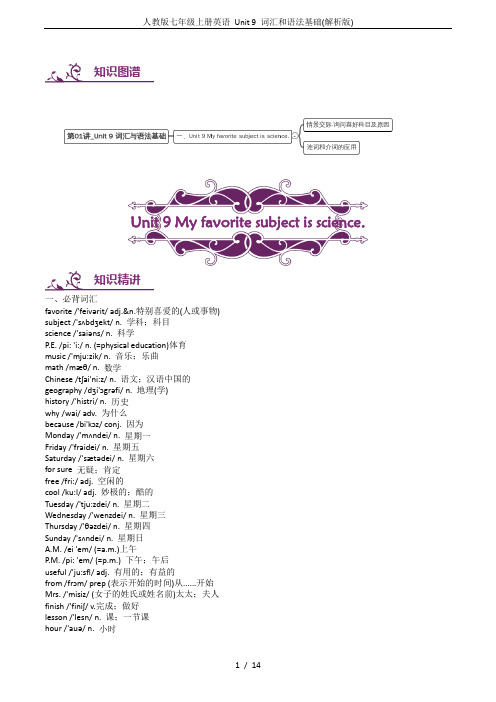
知识图谱Unit 9 My favorite subject is science.知识精讲一、必背词汇favorite /'feivərit/ adj.&n.特别喜爱的(人或事物)subject /'sʌbdʒekt/ n. 学科;科目science /'saiəns/ n. 科学P.E. /pi: 'i:/ n. (=physical education)体育music /'mju:zik/ n. 音乐;乐曲math /mæθ/ n. 数学Chinese /tʃai'ni:z/ n. 语文;汉语中国的geography /dʒi'ɔgrəfi/ n. 地理(学)history /'histri/ n. 历史why /wai/ adv. 为什么because /bi'kɔz/ conj. 因为Monday /'mʌndei/ n. 星期一Friday /'fraidei/ n. 星期五Saturday /'sætədei/ n. 星期六for sure 无疑;肯定free /fri:/ adj. 空闲的cool /ku:l/ adj. 妙极的;酷的Tuesday /'tju:zdei/ n. 星期二Wednesday /'wenzdei/ n. 星期三Thursday /'θəzdei/ n. 星期四Sunday /'sʌndei/ n. 星期日A.M. /ei 'em/ (=a.m.)上午P.M. /pi: 'em/ (=p.m.) 下午;午后useful /'ju:sfl/ adj. 有用的;有益的from /frɔm/ prep (表示开始的时间)从......开始Mrs. /'misiz/ (女子的姓氏或姓名前)太太;夫人finish /'finiʃ/ v.完成;做好lesson /'lesn/ n. 课;一节课hour /'auə/ n. 小时二、重点词汇1. favorite adjective & noun /ˈfeɪvərɪt/1). adj.best liked or most enjoyed最喜欢的;特别喜爱的例句:My favorite song is Yesterday Once More.我最喜欢的歌是《昔日重现》。
人教版 新目标七年级上 Unit 9 重难点归纳
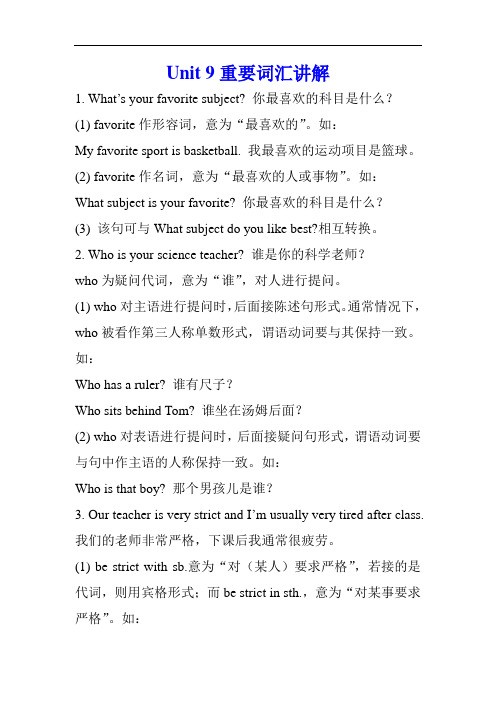
Unit 9重要词汇讲解1. What’s your favorite subject? 你最喜欢的科目是什么?(1) favorite作形容词,意为“最喜欢的”。
如:My favorite sport is basketball. 我最喜欢的运动项目是篮球。
(2) favorite作名词,意为“最喜欢的人或事物”。
如:What subject is your favorite? 你最喜欢的科目是什么?(3) 该句可与What subject do you like best?相互转换。
2. Who is your science teacher? 谁是你的科学老师?who为疑问代词,意为“谁”,对人进行提问。
(1) who对主语进行提问时,后面接陈述句形式。
通常情况下,who被看作第三人称单数形式,谓语动词要与其保持一致。
如:Who has a ruler? 谁有尺子?Who sits behind Tom? 谁坐在汤姆后面?(2) who对表语进行提问时,后面接疑问句形式,谓语动词要与句中作主语的人称保持一致。
如:Who is that boy? 那个男孩儿是谁?3. Our teacher is very strict and I’m usually very tired after class. 我们的老师非常严格,下课后我通常很疲劳。
(1) be strict with sb.意为“对(某人)要求严格”,若接的是代词,则用宾格形式;而be strict in sth.,意为“对某事要求严格”。
如:My mother is very strict with me. 我的妈妈对我要求严格。
His teacher is very strict in his study. 他的老师对他的学习要求很严格。
(2) after class意为“下课后”,类似的短语有很多,如after lunch(午饭后),after school(放学后)等等。
人教新目标英语七年级上册Unit9Myfavoritesubjectisscience单元知识归纳总结

Unit9 单元知识归纳总结【短语归纳】P.E. teacher 体育老师the next day 第二天have math上数学课for two hours 两小时favorite subject最喜欢的学科play games 玩游戏on Monday 在星期一have an art lesson 上美术课【用法集萃】1. play games with sb. 和某人玩游戏2. finish doing sth.完成做某事3. from…to从……到……4. have +学科名词上……课5. on +星期几在星期几【语法专项】特殊疑问句特殊疑问句是对句中某一部分内容进行提问,以what, who, when, where, why等疑问词引导的疑问句。
特殊疑问句应根据具体内容作答,不能用yes或no回答1.结构:疑问词+—般疑问句(be动词/助动词/情态动词+主语+其他)?2.疑问词用法小结:(1)什么都要问的what疑问代词what的基本含义是“什么”,通常用来询问姓名、物品、数学运算结果或什么时间、做什么事等。
what可与grade,class,color等名词“结盟”,用来询问某些相对具体的信息。
—What’s your favorite subject?你最喜欢的学科是什么?—My favorite subject is English.我最喜欢的学科是英语。
What grade is she in?她在几年级?What color is your bag?你的包是什么颜色的?(2)谁见谁爱的whowho是疑问代词,它的意思是“谁”,用来询问“人”。
在句中可作主语、宾语或表语。
Who do you want to help?你想帮助谁?当who作主语时,句子要用陈述语序,谓语动词多用单数形式。
Who likes playing the guitar?谁喜欢弹吉他?(3)—探究竟的whywhy是疑问副词,意思是“为什么”,多用来询问原因,回答时多用连词because 引导的句子,意为“因为……”。
人教版新目标七年级英语上册Unit 9讲义及重点总结
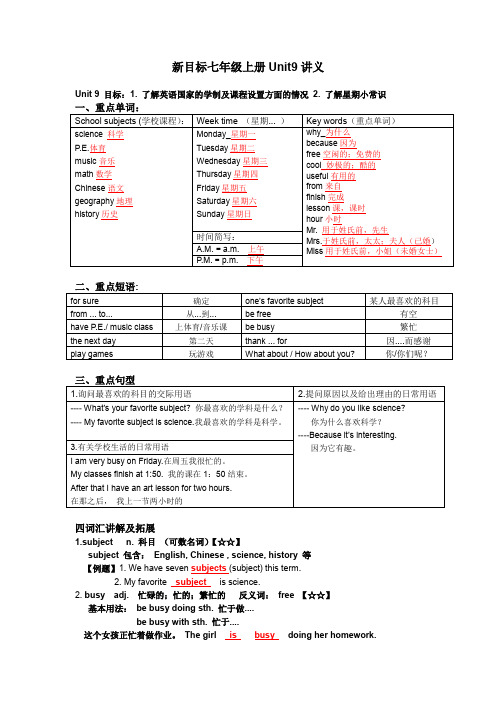
新目标七年级上册Unit9讲义Unit 9 目标:1. 了解英语国家的学制及课程设置方面的情况2. 了解星期小常识四词汇讲解及拓展1.subject n. 科目(可数名词)【☆☆】subject 包含:English, Chinese , science, history 等【例题】1. We have seven subjects (subject) this term.2. My favorite subject is science.2. busy adj. 忙碌的;忙的;繁忙的反义词:free 【☆☆】基本用法:be busy doing sth. 忙于做....be busy with sth. 忙于....这个女孩正忙着做作业。
The girl is busy doing her homework.The girl is busy with her homework.【例题】1. 我妈妈星期六有空。
My mother is free on Saturday.2. —Are you ______ now?—Sorry, I am very busy.A. happyB. fineC. fatD. free3.I like Monday because I have P.E. and history.我喜欢星期一,因为我上体育课和历史课。
【☆☆☆】(1)have + 学科意为:“上某一学科的课”,例如:I have P.E. Class on Tuesday. 我在周二和周四上体育课。
She has art class on Friday. 她在周五上艺术课。
【巩固】上课have a class / lesson 吃早餐have breakfasthave a school trip 举行一次校外郊游have a party举行一个生日聚会【例题】1. Kate ______ English and art on Friday afternoon.A. getsB. hasC. getD. have4.Because the next day is Saturday! 因为第二天是星期六。
人教版七年级上册英语Unit9语法知识点讲义(含练习题及答案)
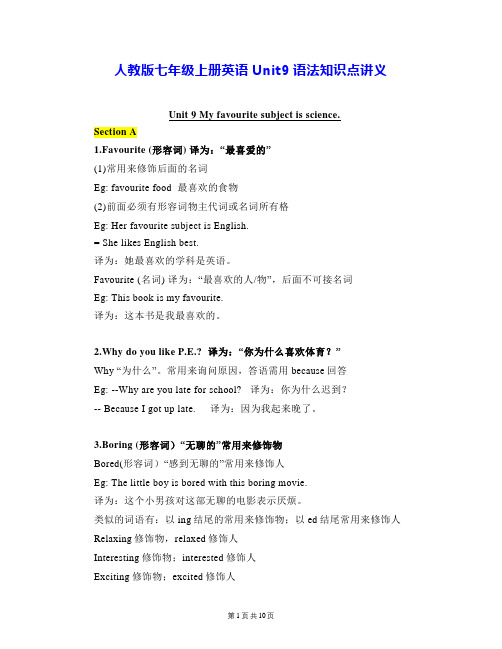
人教版七年级上册英语Unit9语法知识点讲义Unit 9 My favourite subject is science.Section A1.Favourite (形容词) 译为:“最喜爱的”(1)常用来修饰后面的名词Eg: favourite food 最喜欢的食物(2)前面必须有形容词物主代词或名词所有格Eg: Her favourite subject is English.= She likes English best.译为:她最喜欢的学科是英语。
Favourite (名词) 译为:“最喜欢的人/物”,后面不可接名词Eg: This book is my favourite.译为:这本书是我最喜欢的。
2.Why do you like P.E.? 译为:“你为什么喜欢体育?”Why “为什么”。
常用来询问原因,答语需用because回答Eg: --Why are you late for school? 译为:你为什么迟到?-- Because I got up late. 译为:因为我起来晚了。
3.Boring (形容词)“无聊的”常用来修饰物Bored(形容词)“感到无聊的”常用来修饰人Eg: The little boy is bored with this boring movie.译为:这个小男孩对这部无聊的电影表示厌烦。
类似的词语有:以ing结尾的常用来修饰物;以ed结尾常用来修饰人Relaxing修饰物,relaxed修饰人Interesting修饰物;interested修饰人Exciting修饰物;excited修饰人4.Difficult (形容词) “困难的” 其反义词为easy “容易的”Difficulty (名词) “困难” 为可数名词,其复数形式为difficulties常用短语:have difficulties in doing sth. 译为:做某事有困难Eg: I have some difficulties in learning English.译为:我在学英语上遇到一些困难。
七年级英语上册Unit9Whatdoeshelooklike单词短语及重点句型新版人教新目标版

Unit 9 重点短语及句型背诵(留存备用考前复习)Key Phrases重点短语1. short/curly/long/straight hair短发/卷发/长发/直发2. wear glasses 戴眼镜3. go to the movie去看电影4.a little late 有点晚5. first of all首先6. (be) of medium height中等身高7. (curly)blond(e) hair 金(卷)发8. short black hair 短黑发 9.a picture of... 一张 ......的画10. police artist 警察画家 11. each criminal每个罪犯12. in newspapers在报纸上 13. the same way同样的方式14. in the end最后 15. a round/ long face圆脸/长脸Key Sentences 重点句型1. What does he look like?他长什么样?2. Yeah, but I may be a little late.对,但是我可能晚一点。
3. Just meet him in front of the cinema first.先在电影院前面与他见面吧。
4. He has brown hair and wears glasses.他留着棕色头发,戴着眼镜。
5.Is he tall or short?他个子高还是矮?6.He isn't tall or short. He's of medium height.他不高不矮,中等个子。
7. He has short curly brown hair.他留着棕色的短卷发。
8. They tell him what the criminal looks like.他们告诉他罪犯的长相。
9. Then Joe draws a picture of the criminal, and the police put it in newspapers and ontelevision to find him.然后,乔画出罪犯的肖像,警察把它放在报纸上和电视上寻找此人。
[全]人教版英语七年级上册Unit 9知识点汇总和考点精讲
![[全]人教版英语七年级上册Unit 9知识点汇总和考点精讲](https://img.taocdn.com/s3/m/3933fa1419e8b8f67d1cb9b1.png)
人教版英语七年级上册Unit 9知识点汇总和考点精讲一、Unit 9 单词favorite /'feivərit/ adj.&n.特别喜爱的(人或事物) subject /'sʌbdʒekt/ n. 学科;科目science /'saiəns/ n. 科学P.E. /pi: 'i:/ n. (=physical education)体育music /'mju:zik/ n. 音乐;乐曲math /mæθ/ n. 数学Chinese /tʃai'ni:z/ n. 语文;汉语中国的geography /dʒi'ɔgrəfi/ n. 地理(学)history /'histri/ n. 历史why /wai/ adv. 为什么because /bi'kɔz/ conj. 因为Monday /'mʌndei/ n. 星期一Friday /'fraidei/ n. 星期五Saturday /'sætədei/ n. 星期六for sure 无疑;肯定free /fri:/ adj. 空闲的cool /ku:l/ adj. 妙极的;酷的Tuesday /'tju:zdei/ n. 星期二Wednesday /'wenzdei/ n. 星期三Thursday /'θəzdei/ n. 星期四Sunday /'sʌndei/ n. 星期日A.M. /ei 'em/ (=a.m.)上午P.M. /pi: 'em/ (=p.m.) 下午;午后useful /'ju:sfl/ adj. 有用的;有益的from /frɔm/ prep (表示开始的时间)从......开始from...to... 从......到......Mrs. /'misiz/ (女子的姓氏或姓名前)太太;夫人finish /'finiʃ/ v. 完成;做好lesson /'lesn/ n. 课;一节课hour /'auə/ n. 小时二、Unit9 知识梳理Unit9 My favorite subject is science.【重点短语】1. my favorite subject(s) 我最喜欢的科目2. have P. E. /a P. E. lesson 上体育课3. play games with us 和我们一起玩游戏4. my science teacher 我的科学老师5. your favorite day 你最喜欢的一天6. the next day 第二天7. David's favorite subject 戴维最喜欢的科目8. on FridayC morning/afternoon/evening)在周五(上午/下午/晚上)9. at 8 :00 在8 点钟10. from 12:00 to 1:00 从1 2 :0 0 到(下午)1 :0 011. after that/class 自那以后/下课后12. great fun 非常有趣13. difficult but interesting 难但有趣14. be OK with sb. 适合某人【重点句型】1. —What's your favorite subject?你最喜欢的科目是什么?—My favorite subject is math.我最喜欢的科目是数学。
2022年新目标人教版七年级上册Unit9知识点
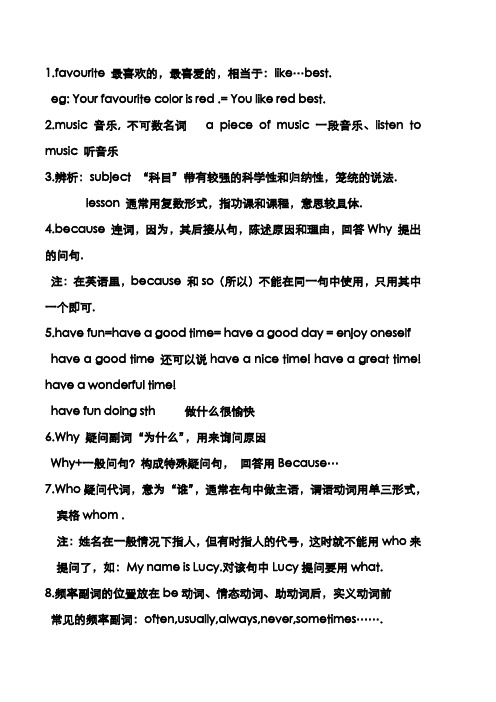
1.favourite 最喜欢的,最喜爱的,相当于:like…best.eg: Your favourite color is red .= You like red best.2.music 音乐, 不可数名词 a piece of music 一段音乐、listen to music 听音乐3.辨析:subject “科目”带有较强的科学性和归纳性,笼统的说法.lesson 通常用复数形式,指功课和课程,意思较具体.4.because 连词,因为,其后接从句,陈述原因和理由,回答Why 提出的问句.注:在英语里,because 和so(所以)不能在同一句中使用,只用其中一个即可.5.have fun=have a good time= have a good day = enjoy oneself have a good time 还可以说have a nice time! have a great time! have a wonderful time!have fun doing sth 做什么很愉快6.Why 疑问副词“为什么”,用来询问原因Why+一般问句?构成特殊疑问句,回答用Because…7.Who疑问代词,意为“谁”,通常在句中做主语,谓语动词用单三形式,宾格whom .注:姓名在一般情况下指人,但有时指人的代号,这时就不能用who来提问了,如:My name is Lucy.对该句中Lucy提问要用what.8.频率副词的位置放在be动词、情态动词、助动词后,实义动词前常见的频率副词:often,usually,always,never,sometimes…….That’s for sure. 的确如此play games with sb. 和某人玩游戏like to do sth / like doing sth. 喜欢做某事9.difficult 形容词困难的,反义词easydifficulty n. 困难be difficult to do sth. 做某事是困难的10.“on”表示星期几或具体某一日及某一日的上午、下午或晚上的名词前,但当星期名称前有this,that,next,last等修饰词时,其前不能再用介词“on”.eful adj. 有用的,动词use.be useful to sb. 对某人是有用的from…to…从…到…12.Mrs. /Mr. /Miss. /Ms. 不能单独使用,需放在姓氏前.Mrs.夫人;太太(用于已婚女子的夫性前)Mr. 先生(用于男子的姓氏前)Miss 小姐(用于未婚女子的姓氏前)Ms. 女士(在不清楚对方是否已婚的情况下使用)13.finish 此处为不及物v. 后面不接n.作及物v.时,后接n. / v.ingfinish doing sth. 完成做某事for + 一段时间,表示“持续多长时间”14.Let’s do sth. 让我们做某事Thank you for = Thanks for +n. / pron./ v.ing want to do sth. 想要做某事。
- 1、下载文档前请自行甄别文档内容的完整性,平台不提供额外的编辑、内容补充、找答案等附加服务。
- 2、"仅部分预览"的文档,不可在线预览部分如存在完整性等问题,可反馈申请退款(可完整预览的文档不适用该条件!)。
- 3、如文档侵犯您的权益,请联系客服反馈,我们会尽快为您处理(人工客服工作时间:9:00-18:30)。
人教版新目标七年级上Unit9 My favoritesubject is science本单元单词表favorite 特别喜爱的(人或事subject 学科;科目science 科学P.E. 体育music 音乐;乐曲math 数学Chinese 语文;汉语中国的geography 地理(学)history 历史why 为什么because 因为Monday 星期一Friday 星期五Saturday 星期六for sure 无疑;肯定free 空闲的cool 妙极的;酷的Tuesday 星期二Wednesday 星期三Thursday 星期四Sunday 星期日A.M. 上午P.M. 下午;午后useful 有用的;有益的from (表示开始的时间)从......开始from...to... 从......到......Mrs (女子的姓氏或姓名前)太太;夫人finish 完成;做好lesson 课;一节课hour 小时单词解析1.lesson n. 课;一节课;教训【解析】do one’s lesson 做功课 have/take lessons 上课give sb. a lesson 给某人一个教训辨析lesson 和class①表示“学校的课时”,lesson 与class 的区别不大。
英式英语中用lesson,美式英语中用class。
②当表示“某种技能,技巧性的课程”时,常用lesson。
如have piano lessons 上钢琴课。
③当表示“教学中的教学单元;课时”时,常用lesson. class 则还有“班,班级”的意思,Lesson Two 第二课;Class One 一班。
注:①lesson和class 着重指教学内容“课时”时,可以互换。
We have four English classes/lessons every week.每周我们上四节英语课。
②表示第几课、功课时只能用lesson。
Please read the first lesson. 请读第一课。
I can help you with your lessons. 我能帮你学习功课。
③表示班级、同学们、开始上课、课堂、课堂活动时只能用class.There are fifteen classes in our school. 我们学校有15个班级。
2.hour n.小时【解析】hour after hour 一小时接一小时地 half an hour 半小时lunch hour 午餐时间 happy hour 快乐的时光谚语:An hour in the morning is worth two in the evening.3.free adj. 空闲的;自由的;免费的【解析】反义词:busybe free to do sth. 可以自由的做…… /有空做某事feel free to do 尽管做;请不要客气for free 免费 be free from 不受……的影响be free = have (free)time 有空(free 作空闲讲时是形容词,“有空的”,不能说have free)He is a free man. 他是一个自由的人。
This is a free school.这是一所免费的学校。
4.cool adj. 妙极的,酷的(在口语中常用来夸奖某人或某物);凉爽的;冷静的,沉着的keep cool 保持冷静He has a cool head. 他有一个冷静的头脑。
5.Sunday n. 星期【解析】 on Sunday 在星期他 on Sundays 每逢星期天eful adj.有用的;有益的【解析】use n./v. 使用 useless adj. 无用的;无效的be useful to sb. 对某人有用7.from…to…从……到……【解析】from then/now 从那时/现在起 from time to time 不时;偶尔be/come from 来自 from day to day 日复一日from morning to night 从早到晚 from first to last 至始至终8. finish v.完成;做好【解析】finish sth.. 完成某事finish doing sth. 做完某事(只能跟动名词,不能跟动词不定式)9.for sure 无疑;肯定【解析】用于口语,表示赞同或肯定前面的观点。
—Is Tom your best friend?汤姆是你最好的朋友吗?—For sure!当然了!10.because conj. 因为【解析】 because从属连词,意为“因为”,引导原因状语从句,陈述原因或理由,回答why提出的问句。
辨析because 和for:It must have rained last night, for the ground is wet. 昨晚肯定下雨了,因为地面是湿的。
Because this book is very interesting ,so we all like it(×)We all like this book because it’s very interesting.(√)This book is very interesting,so we all like it.(√)11. have P.E. and history 上体育和历史课【解析】have 与学科名称搭配,表示“上某一学科的课”。
P.E.是physical education的缩写形式。
have与不同的名词(短语)搭配,表示不同的含义:①上……课:have music 上音乐课②举办,举行:have a football game 举办一场足球比赛③吃,喝: have lunch 吃午餐 have tea 喝茶④经受,经历:have a good time /day 过得愉快12.favorite (=favourite)adj./n. 特别喜爱的(人或事物)【解析】即可作形容词,又可作名词,复数形式是favorites,意为“最喜欢的人或物”。
favorite(n.)= favorite +名词,其同义表达为like……best.注:favourite 因本身含有“最”的意思,没有比较级和最高级,不能与more,most 连用。
Spring is my most favorite season.(×)Spring is my favorite season.(√)13.music n. 音乐;曲子【解析】listen to music 听音乐 play music 演奏音乐a piece of music 一首曲子14.eye.n. 眼睛【解析】catch one’s eyes 引起某人的注意 keep an eye on 照看;照顾under the eye of sb. 在某人的监视下 look sb. in the eyes 直视某人15.put v.放【解析】put off 推迟 put on 穿上;戴上 put away 收起来put forward 提出 put up with 忍受;容忍 put out 扑灭;生产16.each adj. /pron. 每个;各自【解析】each 用作形容词在,作前置定语,修饰单数不可数名词,谓语动词用单数形式。
用and连接的each 短语,谓语动词也用单数形式。
Each member of the team is given a particular job to do.队里的每个成员都有特定的工作要做。
常用短语: each day 每天 each other 相互17.way n. 方式;路线【解析】by the way 顺便说 in this way 用这种方法on one’s way to 在去……的路上 on the way 在途中;在路上way of life 生活方式 ways and means 方式方法注:way 用作可数名词,意为“方法,方式”时,常与介词in 连用。
如果in 前有this ,that 等限定词,介词in可省略,但如果放在句首,介词in则不可省略。
18. another adj./pron.另一;又一【解析】泛指同类事物中,三者或三者以上的“另一个”,只能代替或修饰单数可数名词。
常用短语:one… another…一个……另一个 one another 互相one after another 一个接一个地谚语:One man’s meat is another man’s poison. 对一个人是肉,对另一个人是毒。
19.end n. 结束;结尾 v.使……结束【解析】 in the end 最后(=at last /finally,反义词:at first 起初)be at an end 结束;终止 come to an end 完毕;结束draw to an end 接近尾声 from beginning to end 从头到尾to the end 到最后20. also adv.也【解析】also 表示“也”常位于系动词,情态动词之后,行为动词之前。
当谓语句首时,常用逗号隔开,这时also 修饰整个句子,相当于汉语中的“同时;而且;还”。
Also,they don’t always remember well. 而且,他们并非总是记得很清楚。
He also wants to go. 他也想去。
21.cinema n.电影院【解析】go to the cinema =go to the movies 去看电影注:cinema作“电影”讲时,前面必须加定冠词the。
ter adv.以后【解析】 later on 后来 sooner or later 迟早23. a little 一点;少量【解析】 a little 修饰不可数名词时,表示数量,相当于some;修饰形式词或副词是,表示程度,与a bit 同义。
常用短语:quite a little 很多 not a little 不少;很多little by little 一点点地;逐渐地 not a bit 一点儿也不比较:【解析】may 是情态动词,其后接动词原形,没有人称和数的变化。
①表示请求许可时,相当于can.,其否定回答常用can not 或must not。
②表示可能性时,其否定回答是may notmay be:“情态动词+动词be”结构,在句中作谓语,意为“也许是”。
maybe:副词,常用于句首作状语,意为“也许”,同义词是perhaps。
